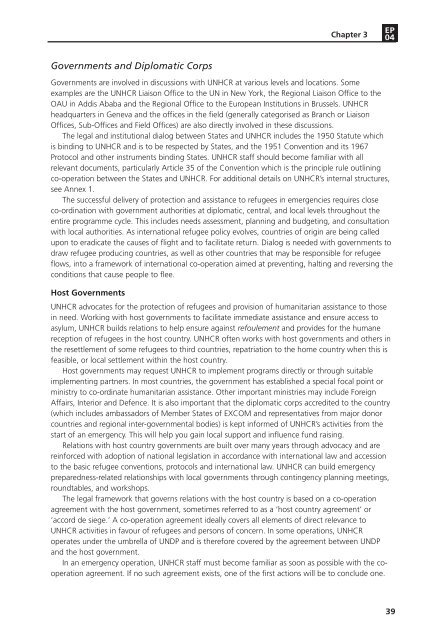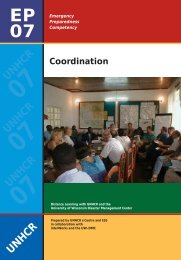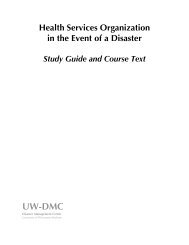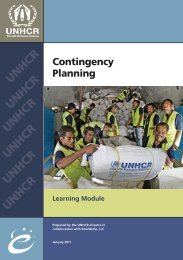Managing External Relations - Disaster Management Center ...
Managing External Relations - Disaster Management Center ...
Managing External Relations - Disaster Management Center ...
Create successful ePaper yourself
Turn your PDF publications into a flip-book with our unique Google optimized e-Paper software.
Governments and Diplomatic Corps<br />
Chapter 3<br />
Governments are involved in discussions with UNHCR at various levels and locations. Some<br />
examples are the UNHCR Liaison Office to the UN in New York, the Regional Liaison Office to the<br />
OAU in Addis Ababa and the Regional Office to the European Institutions in Brussels. UNHCR<br />
headquarters in Geneva and the offices in the field (generally categorised as Branch or Liaison<br />
Offices, Sub-Offices and Field Offices) are also directly involved in these discussions.<br />
The legal and institutional dialog between States and UNHCR includes the 1950 Statute which<br />
is binding to UNHCR and is to be respected by States, and the 1951 Convention and its 1967<br />
Protocol and other instruments binding States. UNHCR staff should become familiar with all<br />
relevant documents, particularly Article 35 of the Convention which is the principle rule outlining<br />
co-operation between the States and UNHCR. For additional details on UNHCR’s internal structures,<br />
see Annex 1.<br />
The successful delivery of protection and assistance to refugees in emergencies requires close<br />
co-ordination with government authorities at diplomatic, central, and local levels throughout the<br />
entire programme cycle. This includes needs assessment, planning and budgeting, and consultation<br />
with local authorities. As international refugee policy evolves, countries of origin are being called<br />
upon to eradicate the causes of flight and to facilitate return. Dialog is needed with governments to<br />
draw refugee producing countries, as well as other countries that may be responsible for refugee<br />
flows, into a framework of international co-operation aimed at preventing, halting and reversing the<br />
conditions that cause people to flee.<br />
Host Governments<br />
UNHCR advocates for the protection of refugees and provision of humanitarian assistance to those<br />
in need. Working with host governments to facilitate immediate assistance and ensure access to<br />
asylum, UNHCR builds relations to help ensure against refoulement and provides for the humane<br />
reception of refugees in the host country. UNHCR often works with host governments and others in<br />
the resettlement of some refugees to third countries, repatriation to the home country when this is<br />
feasible, or local settlement within the host country.<br />
Host governments may request UNHCR to implement programs directly or through suitable<br />
implementing partners. In most countries, the government has established a special focal point or<br />
ministry to co-ordinate humanitarian assistance. Other important ministries may include Foreign<br />
Affairs, Interior and Defence. It is also important that the diplomatic corps accredited to the country<br />
(which includes ambassadors of Member States of EXCOM and representatives from major donor<br />
countries and regional inter-governmental bodies) is kept informed of UNHCR’s activities from the<br />
start of an emergency. This will help you gain local support and influence fund raising.<br />
<strong>Relations</strong> with host country governments are built over many years through advocacy and are<br />
reinforced with adoption of national legislation in accordance with international law and accession<br />
to the basic refugee conventions, protocols and international law. UNHCR can build emergency<br />
preparedness-related relationships with local governments through contingency planning meetings,<br />
roundtables, and workshops.<br />
The legal framework that governs relations with the host country is based on a co-operation<br />
agreement with the host government, sometimes referred to as a ‘host country agreement’ or<br />
‘accord de siege.’ A co-operation agreement ideally covers all elements of direct relevance to<br />
UNHCR activities in favour of refugees and persons of concern. In some operations, UNHCR<br />
operates under the umbrella of UNDP and is therefore covered by the agreement between UNDP<br />
and the host government.<br />
In an emergency operation, UNHCR staff must become familiar as soon as possible with the cooperation<br />
agreement. If no such agreement exists, one of the first actions will be to conclude one.<br />
EP<br />
04<br />
39








